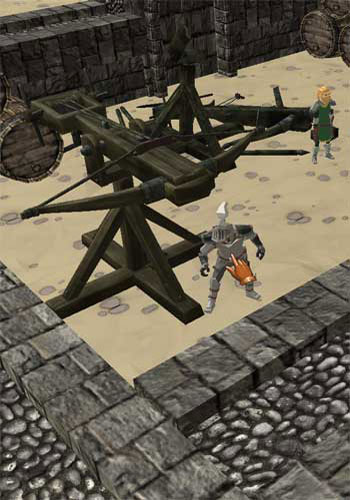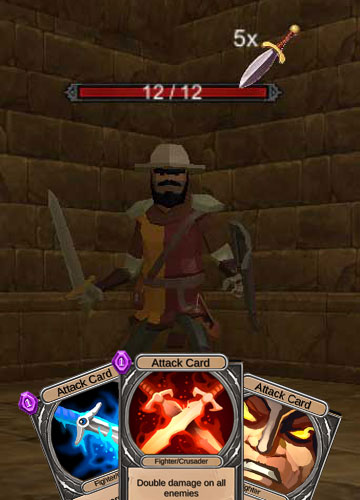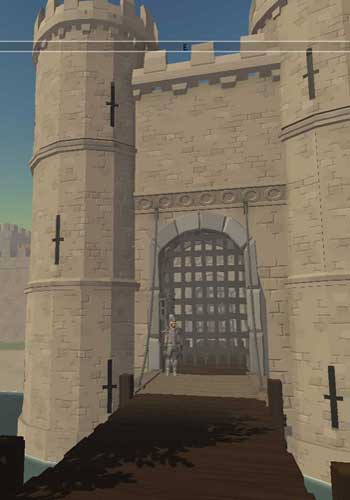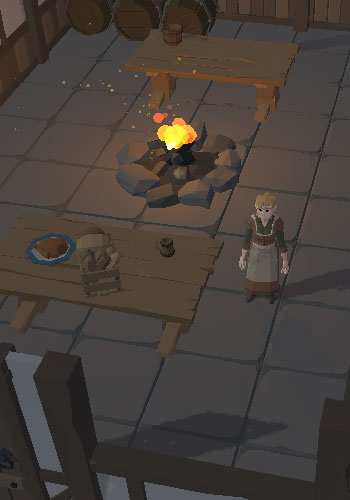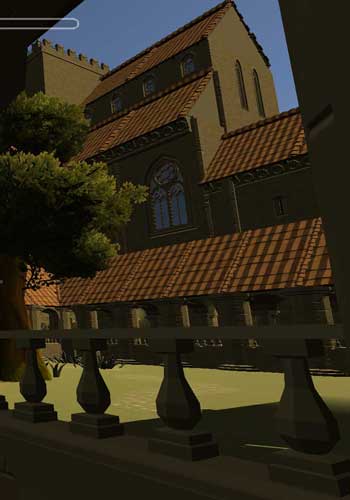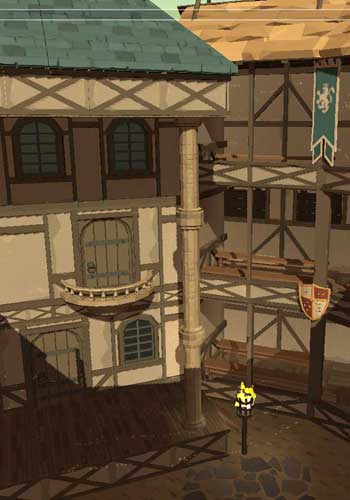Role-playing Games
Medieval Dialogue
Creating a conversation in medieval-style language involves using vocabulary, phrasing, and grammar that evoke the Middle Ages.
Greetings
| Category | Details |
General |
"Good morrow" - Good morning. "Good day" - General greeting. "Hail" - Greeting or shout of approval. E.g. Hail fellow. "Well met" - Pleased to met you. "How dost thou?" - How are you? "How fare thee?" - More intimate how are you? "How dost thou fare?" "What ho!" - A friendly greeting. |
Formal |
"My liege" - When addressing the King or a Lord. "Your Grace" - Addressing a duke, duchess or high ranking clergy. "My Lord" - Addressing a male noble. "My Lady" - Addressing a female noble. |
Religious |
"Blessings upon thee" - General greeting. "Peace be upon thee" - ditto. "Pax vobiscum" - In Latin, peace be with you. "God save thee" - General greeting. "Peace and grace be thine" - Formal. |
Farewells
| Category | Details |
General |
"Fare thee well" - General goodbye. "Godspeed" - Have a safe journey. "Anon" - Until later. "Mayhap we shall meet again" - Until we meet again. |
Religious |
"Go with God, my child" - General goodbye. "May the Lord guide thy steps" - Have a safe journey. "Peace be with thee, until we meet again" - Until later. "May thy path be lit by the grace of the Almighty" - Have a safe journey. "Go in peace, and take care upon the road" - Have a safe journey. |
General
| Category | Details |
Expressions of Courtesy |
"Prithee" - Please, short for I pray thee. "I beseech thee" - I ask you. "Pray, continue" - Go on. "I beseech thee" - I ask you. |
Inquiries |
"What news?" - What's happening. "How now?" - How's things? "Whither goest thou?" - Where are you going? "What dost thou seek?" - What are you looking for? |
Romantic |
"My heart is thine" - A declaration of love. "Thy beauty doth rival the stars" - A compliment. |
Wisdom |
"Thou hast spoken truly" - You are correct. "Thou art wise beyond measure" - You are wise. |
Time of day
| Category | Details |
Morning |
"The breaking of the eastern light" - Sunrise.
"The cock hath crowed" - Common early morning sounds.
"The dew still glistens on the grass" - poetic.
"The sun climbs o'er yonder hills" - |
Midday |
"The sun standeth in the zenith" - Sun is overhead. "The shadow retreats beneath the feet" - ditto. "The bell tolls for sext" - Sext is a religious service that takes place at noon, or the sixth hour of the day after dawn. |
Afternoon |
"The sun leaneth toward the west" - Setting of the sun. "The golden orb doth wane" - ditto. "The day waxes old" - Again. |
Evening/Sunset |
"The gloaming doth settle upon the land" - Twilight. "The sun kisses the earth farewell" - ditto. "Night's curtain begins to fall" - Again. "The herds return to the fold" - End of the day's work. "Vespers call the faithful to prayer" - Religious service at runset (6pm). "The shadows lengthen upon the earth" - Sunset. |
Nightfall |
"The stars awaken in their heavenly dance" - Appearance of stars. "The cloak of night doth shroud the world" - Darkness begins. "The hour of compline is at hand" - Religious service at end of day (9pm). |
Midnight |
"The dead of night" - Stillness and quiet of midnight. "At the witching hour" - Superstitions around midnight being time for supernatural things. "The world slumbers beneath heaven's watch" - Quiet and rest of nighttime. |
Towns and Villages
| Category | Details |
Medieval Markets |
"What be thy price for this wares?" - Asking the price. "Fine wares for the noble and common alike!" - A merchant's pitch. "Thou drivest a hard bargain" - You are good at bartering. |
The Inn |
"The ale is weak, and the bread is stale." - Complaints about the inn. |
The Windmill |
"The miller doth steal a measure of grain" - The miller is making extra profits. |
Misc. |
"He works as though the devil be at his heels" - Someone working frantically. |
Warnings
| Category | Details |
General |
"Beware the wolf at the fold." - A hidden danger or betryal. "Mark my words, ill winds blow this way." - A omen of danger. "Tarry not, or night shall find thee." - Hurry, nightime approaches. |
Phases used in Monastic Settings
| Category | Details |
Welcomes |
"Thou art welcome in this holy place" - A standard greeting. "What seekest thou in this house of God?" - Asking a visitor's purpose. "May thy pilgrimage bear thee much fruit" - A wish for a successful journey. |
Daily Routines |
"The bell tolls for lauds/matins" - Prayer times announced. "The scriptorium awaiteth thy hand" - Instructing a monk to the writing room. "Brother, hast thou tended the cloister garden?" - Asking about work progress. |
Interactions |
"Let us break our fast with humble fare" - Announcing the first meal of the day. "Brother, thy silence is commendable" - Praising adherence to the vow of silence. "Sister, let us take to our prayers" - Inviting a fellow nun to pray. |
Expressions of Piety |
"To labor is to pray" - A common monastic phrase emphasizing work as worship. "Our lives are but dust in the eyes of the Lord" - A reflection on humility. "May we walk ever in the footsteps of Christ" - A pious aspiration. |
Congregation Blessings |
"May God's light shine upon thee" - A general blessing. "The peace of Christ be with thee always" - A standard benediction. "May the Virgin watch over thee" - A blessing invoking Mary. "Go forth in the name of the Lord" - Dismissal at the end of mass. |
During Confession |
"Thy sins are forgiven, go and sin no more" - After absolution. "Seek not the path of darkness, but walk in the light of Christ" - Encouraging repentance. |
Protection Blessings |
"By this holy water, may thy soul be cleansed" - Spoken during a blessing with holy water. "Christ shield thee from harm and guide thy way" - A protective blessing. "Blessings upon thee and thine." - A blessing for someone and their family. |
Example
"A weary traveler tired from a long pilgrimage approaches the gates of a secluded abbey, looking for shelter from the storm. The monk, dressed in a simple robe, greets the pilgim.

"Blessings upon thee, traveler. What dost thou seek in this humble house of God?

"Good morrow, Brother. I am but a weary pilgrim, coming from Evesham on pilgrimage to the holy shrine of St. Wulfstan at Worcester. Might I find rest within these sacred walls?


"This house is a haven for the faithful and a refuge for the wayfarer so thou art welcome, my child. Enter, and lay thy burdens down.

"I thank thee kindly, Brother. My journey hath been long and fraught with trials. A storm on the Worcester road nearly swept me away, and my provisions are spent.


"The Lord is merciful, for He hath guided thee safely to this place. Come, share of our bread and water, and warm thyself by the hearth. The abbey doth provide for the weary.
Inverted Syntax
Sentence structures often deviate from modern norms, e.g., *"What sayest thou?"* instead of *"What do you say?"
Normal
Inverted
Your hearth offers a most welcome respite.
A most welcome respite your hearth offers.
My heart be heavy with guilt from sins past.
With guilt from sins past my heart be heavy.
My journey hath been long and fraught with trials.
Long and faught with trials my journey hath been.
I fear I have strayed from the path of righteousness.
From the path of righteousness I fear I have strayed.
Silks from the East and velvets from Venice—fit for a queen's gown or a lady's chamber.
For a queen's gown or a lady's chamber, these silks from the East and velvets from Venice are fit.
I offer fair prices.
Fair prices, I offer.
Words
| Category | Details |
Me and You |
"thou" - You. "thee" - You. "thy" - your. "thine" - yours. |
Here and there |
"hie" - Quickly go to. "thither" - To that place; there. "hither" - To this place; here. |
General |
"anon" - Shortly; soon. |
Agreement / Understanding |
"counsel" - Advice. {Thy counsel is well taken.} "by my troth" - Believe me; loyalty, I swear; in truth. "aye" - Yes. "nay" - No. "soothly" - Indeed; truly. "it is sooth" - It is true. "verily" - Truly. "methinks" - it seems to me. |
Animals |
"kine" - Cows. "lowing" - Deep sound made by cows. |

